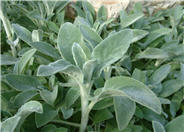
Common name:Curly Top or Leather Leaf Sedge
Botanical name:Carex buchananii
This orange-bronze ornamental grass/reed is 2-3' tall and 1-2' wide and does best in full sun to part shade. It needs moist soil so plant near a water feature or pond.

Common name:Mexican Bush Sage, Mexican Sage
Botanical name:Salvia leucantha
The Mexican Sage is a bushy shrub that grows 3'-4' tall and wide. It has hairy white stems, grey-green leaves and velvet-like purple flower spikes that bloom summer through fall. This shrub tolerates sun, light shade, little water, and is hardy to 15 degrees F. The Mexican Sage attracts hummingbirds. Be careful not to overwater. -Cornflower Farms

Common name:Lamb's Ear
Botanical name:Stachys byzantina
This tiny shrub will grow less than 1' tall and has medium-size, greyish-green leaves with blue and lavender flowers that bloom in the spring. This shrub is grown more for its velvety leaves than the flowers. It is drought tolerant once it's established. Be careful not to overwater.

Common name:Purple Smoke Tree
Botanical name:Cotinus coggygria 'Purpureus'
A deciduous shrub or small tree that grows up to 10' tall, the "Purpureus" is grown for its wispy, thread-like flower clusters in summer. Its green foliage turns a brilliant purple and then yellow to red in the fall. This shrub is a show stopper! It prefers full sun but will do better with afternoon shade in hot inland areas. This attractive shrub is drought tolerant once it's established.

Common name:Moonshine Yarrow, Milfoil, Sneezewo
Botanical name:Achillea 'Moonshine'
Long, straight stems with pale yellow flowers are striking on the mats of green to grey-green leaves of this plant, which are flatter and less divided than those of the Achillea millefolium. This Yarrow propagates easily from rooted cuttings or divisions which should be performed in the early spring or fall. Following bloom, one should dead head the plant and divide the clumps when it appears crowded. Introduced by Alan Bloom in the 1950's.

Common name:Chinese Wisteria
Botanical name:Wisteria sinensis
While the sinensis is similar to the floribunda, it bears more rounded, full clusters of strongly fragrant flowers which open more or less all at once. There are usually 13-15 leaflets per leaf, and they require full sun and average to little watering. It comes in many colors such as blues, whites and purples.-Monterey Bay Nursery

Common name:Nandina, Heavenly Bamboo
Botanical name:Nandina domestica
Nandina domestica is a graceful upright shrub that grows from 3'-6' in height. It gets its name from its bamboo-like growth habit. When thinned from the center it bears a remarkable resemblance to bamboo. It is best used in groups. It can be used in a shaded patio or out in a shrub border with full sun. An interesting feature of Heavenly Bamboo is the bronze color in the new growth when planted in full sun. It also bears clusters of white flowers in the spring.

Common name:Society Garlic
Botanical name:Tulbaghia violacea
This clumping perennial will grow less than 1' tall and has narrow, blue-green leaves. Clusters of lavender flowers bloom in spring and summer. Leaves and flowers have a distinct onion or garlic smell if crushed.

Common name:Powis Castle Artemisia
Botanical name:Artemisia 'Powis Castle'
This mounding shrub reaches 3 ft. high and up to 5ft. wide with fine silver foliage. It does well in coastal areas as well as inland warm areas. It rarely blooms but is used for its beautiful foliage. It is striking next to perennials with bright colors. This shrub prefers full sun and well draining soil. It is drought tolerant once it's established.

Common name:Catmint
Botanical name:Nepeta X faassenii
Nepeta faassenii makes soft, grey-green, undulating mounds to 1.5' high in bloom, spreading 3'-4' wide. The small leaves are attractive to cats. This perennial has lavender blue flowers in summer. Catmint can be planted in sun or shade and needs medium amount of water. Prune spent flowers to encourage more blooms.
More than half of the water used at your home is for outside purposes. Studies show that on average, half of the water used outdoors is wasted. The leading cause of waste is incorrectly set and poorly managed irrigation controllers. The second biggest cause of wastage is broken irrigation equipment that goes undetected. There are a few basic things you can do to make a big difference in your water use.
Click in the green box for more information
Designer: Terri Nichols
Photographer: GardenSoft
Incorporate compost 6" into your soil to retain water, reduce compaction, feed earthworms, and provide valuable nutrients to your plants.
Drip and other smart irrigation delivers water directly to roots, allowing no excess water for weeds.